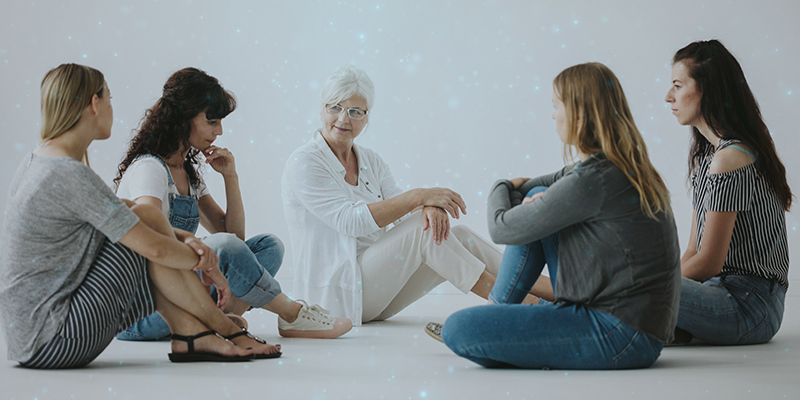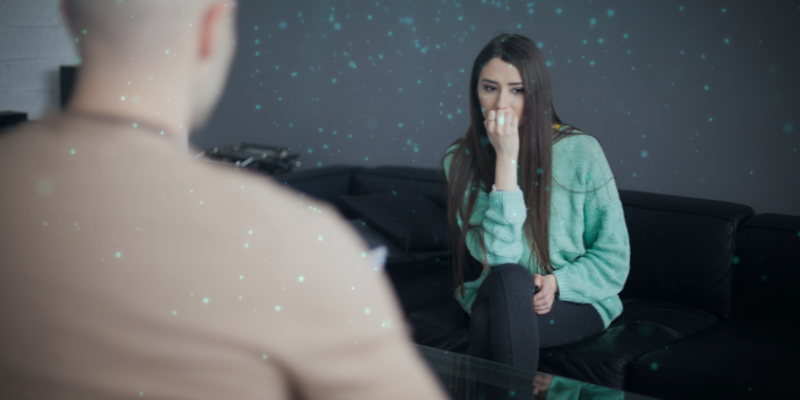
Sleep, glorious sleep! Why is this natural bodily function so elusive—especially if you struggle with depression? Most of us know that getting 7-9 hours of restorative sleep each night is essential for healthy brain and body function, but it may be a surprise to learn that sleep—or the lack thereof—is tightly linked to mental health as well.
THE MOOD-SLEEP CONNECTION
Research has found that sleep and depression are deeply intertwined. Experts believe that there’s likely overlap between the neural mechanisms that control sleep and the neural mechanisms that regulate mood. Those who struggle with sleep are at greater risk for depression (or a depressive relapse), and those who are depressed are very likely to have problems with sleep.
When you consider that an estimated 50-70 million people in the U.S. suffer from disordered sleep and roughly 17.3 million U.S. adults are affected by depression, the impact of the bi-directional relationship between sleep and depression is worth understanding. Here’s what you need to know if you—or someone you love—struggle with sleep, depression, or both.
Insomnia is defined as difficulty falling or staying asleep, or early morning wakening—and those who have it are 3 times more likely to develop depression. Click To TweetSLEEP DISORDERS AND DEPRESSION
The link between depression and sleep disorders is strong. In fact, one study reports that researchers caution medical professionals against making a depression diagnosis if no sleep disturbances are evident, as they are nearly always present with persistent low mood. Unfortunately, sleep problems can exacerbate depression, leading to a negative cycle between depression and sleep that can be very difficult to break.
Indeed, people with depression suffer from sleep disorders at astounding rates. One study found 97% of its depressed participants reported having a sleep disorder, and in clinical samples, about 75% of depressed patients have the most common sleep disorder, insomnia. Insomnia is defined as difficulty falling or staying asleep, or early morning wakening—and those who have it are 3 times more likely to develop depression, a study on sleep disturbances reports.
Hypersomnia (excessive daytime sleepiness and/or total sleep time) is present in roughly 40% of young adults with depression and 10% of adults over 50—and with a higher incidence in women of all ages, research has found. For hypersomnia patients with depression, there’s also an increased risk of suicide. In some cases, depressed patients may experience both insomnia and hypersomnia in a single bout of depression.
Additionally, a 2019 observational study found that obstructive sleep apnea (OSA)—when you snore loudly, stop breathing multiple times at night, and often feel excessively tired during the day—is associated with an increased incidence of depression, particularly in women. One study estimates that 17.6% of those with OSA also have depression, and 18% of those with depression also have OSA.
It’s important to note that while issues of sleep regulation can be secondary to depression, more often they precede it and can persist even during remission. Hence, it’s important to address both sleep issues and depression to ensure the best outcome if you struggle with low mood and/or sleep.
YOUR BRAIN, SLEEP, AND DEPRESSION
When you sleep, your brain conducts cleaning and maintenance—eliminating waste that builds up as a result of daytime functioning and consolidating learning and memory as it prepares for the following day. Other processes during sleep are important to immune health, control of appetite, and, importantly, neurotransmitter production. Of course, sleep disorders compromise these functions.
A balance of increasing and decreasing neurotransmitters are needed for the mutual transformation between sleep and wake. However, if these relational neurotransmitters are disrupted or released abnormally, it can affect the normal stages of sleep, causing sleep problems, such as trouble falling asleep and staying asleep. Depression is associated with low levels of a number of these neurotransmitters.
Research has found changes in what’s called “sleep architecture” (the normal phases of sleep) in depressed patients—such as alterations in slow-wave sleep and rapid eye movement (REM) sleep. Specifically, REM sleep appears to be experienced earlier in the night, leaving less time for restorative slow-wave sleep, which is associated with mood problems like depression.
Many antidepressant medications aim to alleviate depressed symptoms by correcting neurotransmitter levels and restoring the normal phases of sleep, reports a review on antidepressants and sleep, which can be an effective treatment for some people. However, better results are seen when antidepressant treatment is combined with therapy, according to an online report from Harvard Medical School.
TREATING SLEEP ISSUES AND DEPRESSION
If you think you may be suffering from a sleep disorder and/or depression, it is important to first be properly diagnosed by a medical professional. There are several underlying causes of sleep disorders and 6 different types that may or may not be related to depression. Brain SPECT imaging at Amen Clinics has shown that there are 7 different brain patterns associated with depression. Accurate diagnosis is essential to determine the appropriate treatment.
One of the more promising new methods for addressing both disordered sleep and low mood is something called cognitive behavioral therapy for insomnia (CBTI). In one small study, patients who had both insomnia and mild depression underwent 6 weeks of CBTI, which included sleep hygiene education, muscle relaxation, and controlling stimuli. After 3 months, remarkably, all of the patients who participated in the CBTI no longer exhibited clinically measurable insomnia, and a number of the patients were no longer in a depressive episode.
Of course, you can begin practicing good sleep hygiene starting today to help improve your sleep and boost your mood.
6 WAYS TO IMPROVE SLEEP AND BOOST MOOD
Ensuring you get restorative sleep each night can go a long way to boosting your overall health, as well as your mood.
- Devise a soothing bedtime routine to encourage sleep. Power down electronic devices an hour before you go to bed and dim the lights in your home. Relax in a warm bath or shower, pray or meditate.
- Ensure your bedroom temperature is not too warm but slightly on the cool side.
- Use ear plugs or an eye mask, if need be, to ensure it is quiet and dark. If you don’t like wearing an eye mask, invest in some blackout curtains or shades.
- Follow regular sleep/wake time by going to bed at the same time every night and waking up at the same time every morning. This will help to regulate your internal body clock and make sleeplessness less likely.
- Enjoy reading a book (but not an e-reader or tablet as the light will activate your brain). Preferably choose something dense and not overly exciting like a spiritual book or scripture. You want to promote sleep, not stay up all night reading!
- Indulge in some sound therapy. It can be very calming. Consider getting a singing bowl or turning on soothing sounds, a fan, or soft music. Look into sleep-enhancing music.
In addition to restful sleep, boost your mood by getting regular exercise, eating a brain healthy nutrients, and connecting with others. Keep it simple and build on your healthy habits, one at a time.
Depression, sleep disorders, and other mental health issues can’t wait. At Amen Clinics, we’re here for you. We offer in-clinic brain scanning and appointments, as well as mental telehealth, clinical evaluations, and therapy for adults, teens, children, and couples. Find out more by speaking to a specialist today at 888-288-9834 or visit our contact page here.





Dr Amen , after my operation (6 hours) i developed depression. It’s 6 months & now I’m suicidal. I’m not fat & was active , motorcycles & gym. I’m a flight attendant. Never was sad or had sleeping problems. In an interview you mentioned recovering your brain after surgery. Please help me buy that content. I’ve
Comment by Rajindar Singh — January 7, 2023 @ 5:27 AM
excellent advice!
Comment by Douglas Morris — January 12, 2023 @ 4:16 PM
excellent advice!
Comment by Doug Morris — January 14, 2023 @ 12:29 AM
I have had insomnia for over 10 years and was put on sleep meds. I need to get off them but haven’t been able to. I just can’t go to sleep. I was diagnosed with PTSD and for 1 1/2 years, slept only every other night. Dr gave me sleep med and it worked. I have been on them too long. Addiction.
Comment by Linda Woolery — January 23, 2023 @ 7:26 AM